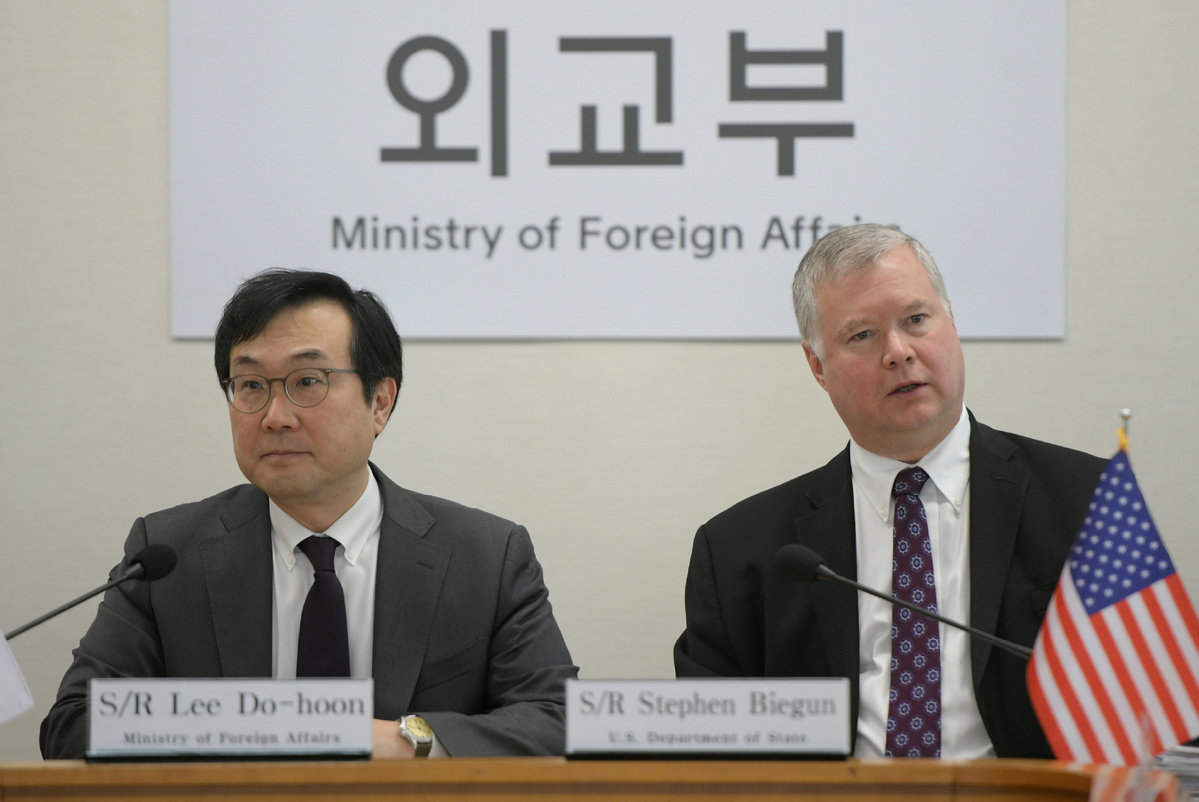Ahead of a year-end deadline given by the Democratic People's Republic of Korea, the United States said it has "no deadline" on nuclear talks, while emphatically asking Pyongyang to return to the negotiating table.

US special representative for the Democratic People's Republic of Korea affairs Stephen Biegun (R) talks with Lee Do-hoon, the special representative for the Korean Peninsula peace and security affairs of the Republic of Korea during their meeting at the foreign ministry in Seoul on May 10, 2019. (Photo: Agencies)
Analyst said relations between the two countries are unlikely to improve in the short term.
Stephen Biegun, US special representative for DPRK affairs, made the remarks in Seoul on Monday, adding that "Washington will not give up", even after Pyongyang's claim that it will take a "new way" if Washington does not make concessions before its deadline.
"Let me speak directly to our counterparts in North Korea (the DPRK): It is time for us to do our jobs. Let's get this done. We are here. And you know how to reach us," he said.
Biegun arrived in Seoul for a three-day visit on Sunday amid heightened tensions between Pyongyang and Washington. He said this year has been a long one and the two sides have not made nearly as much progress as both would have hoped, adding: "We have a goal to fulfill the commitments the two leaders made during their historic summit meeting in Singapore".
He was referring to the first summit between US President Donald Trump and the DPRK's top leader Kim Jong-un in Singapore in June last year.
At the summit, the leaders agreed to seek to build new bilateral relations, make joint efforts to create a lasting and stable peace regime on the Korean Peninsula and work toward the complete denuclearization of the peninsula. So far, none of these agreements has been fulfilled.
Biegun pointed out his team's readiness to resume negotiations with the DPRK, saying the US has offered to Pyongyang a number of creative ways to proceed with "feasible steps and flexibility" to reach "balanced" agreements.
He did not elaborate on these steps, which appeared to have been put forward during his last negotiations with DPRK officials in Sweden in October, which have yielded little progress. At that time, the DPRK accusing the US of having come to the negotiating table "empty-handed".
Pyongyang has since toughened its demands, telling Washington to remove "all obstacles" that threaten the security of the Korean Peninsula and hamper the DPRK's development. Analysts said these demands are seen as calls for sanctions relief and security assurances.
Tension has been rising in recent weeks as Pyongyang has conducted a series of "crucial tests" and traded threats with Trump, stoking fears the two countries could return to the collision course that they had been on before launching diplomacy last year.
On Saturday, the DPRK's Chief of the General Staff Pak Jong-chon said his country was using the recent tests to develop new technologies and strategic weapons. In the event of "acute confrontation", the US "and other hostile forces will spend the year-end in peace only when they hold off any words and deeds rattling us", the country's state media KCNA reported, citing his statement.
Ups and downs
According to Zheng Jiyong, director of the Korea Research Center at Fudan University in Shanghai, relations between the DPRK and the US have seen ups and downs in the longer run of history, "which is quite normal", he said, adding that a solution to the long-standing peninsula issue cannot be expected in the short term.
"The US and the DPRK have taken some steps to engage with each other since the beginning of last year, but core to resolving the Korean Peninsula issues is to seek a balance between denuclearization by Pyongyang and the lifting of Washington's sanctions. However, it is a pity that the two sides rarely touch on this issue in their negotiations," Zheng said.
At this juncture, Zheng said it is even more critical that the momentum of the talks be maintained by the two sides, and both should uphold an inclusive view and keep an open mind to enable longer-running denuclearization talks.
On Monday, Biegun met with the Republic of Korea's President Moon Jae-in for talks, but the two made no opening remarks to media. According to the ROK's Yonhap News Agency, Moon and Biegun had discussed ways to keep nuclear talks with the DPRK alive and maintain momentum in the slow-going peace process.


